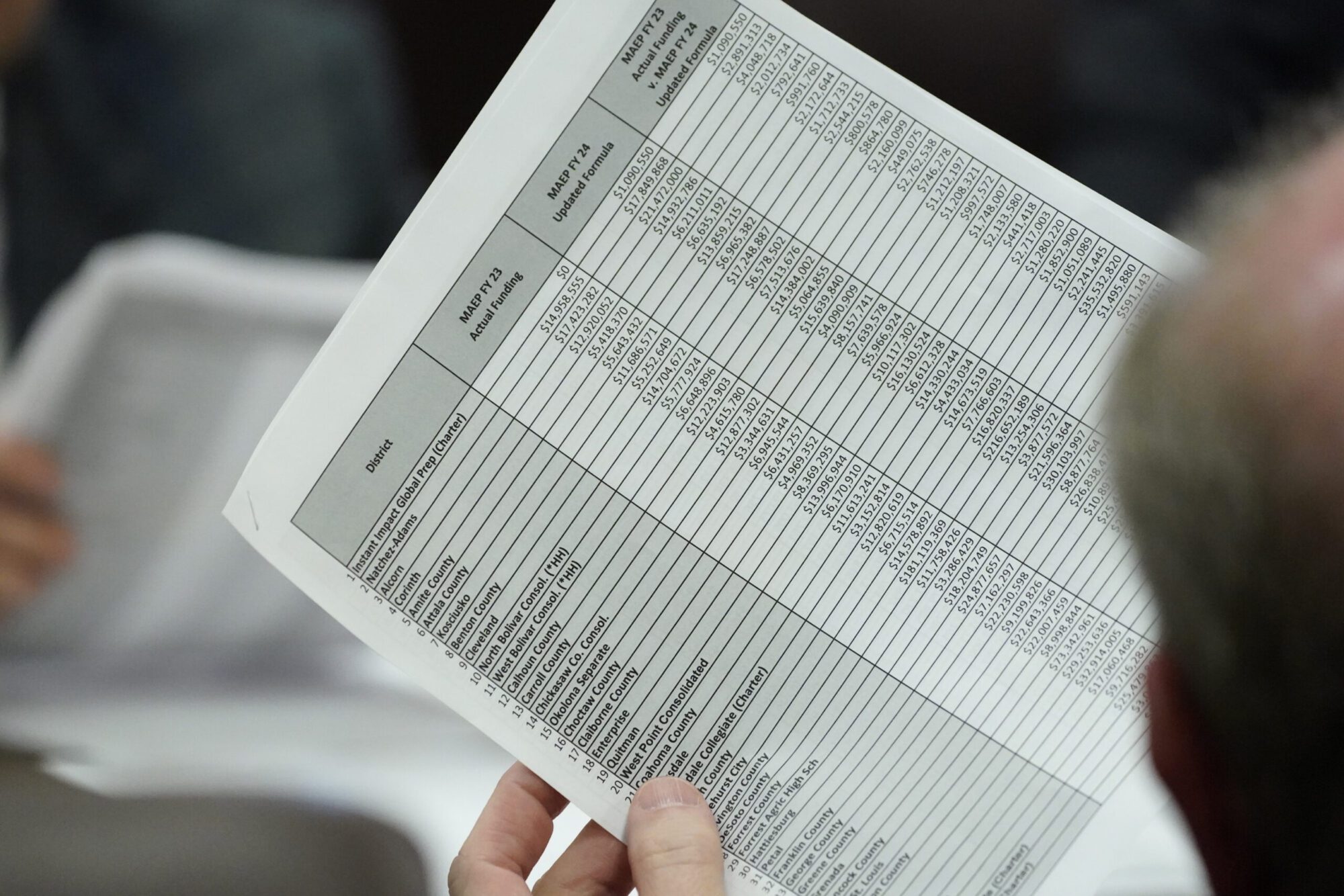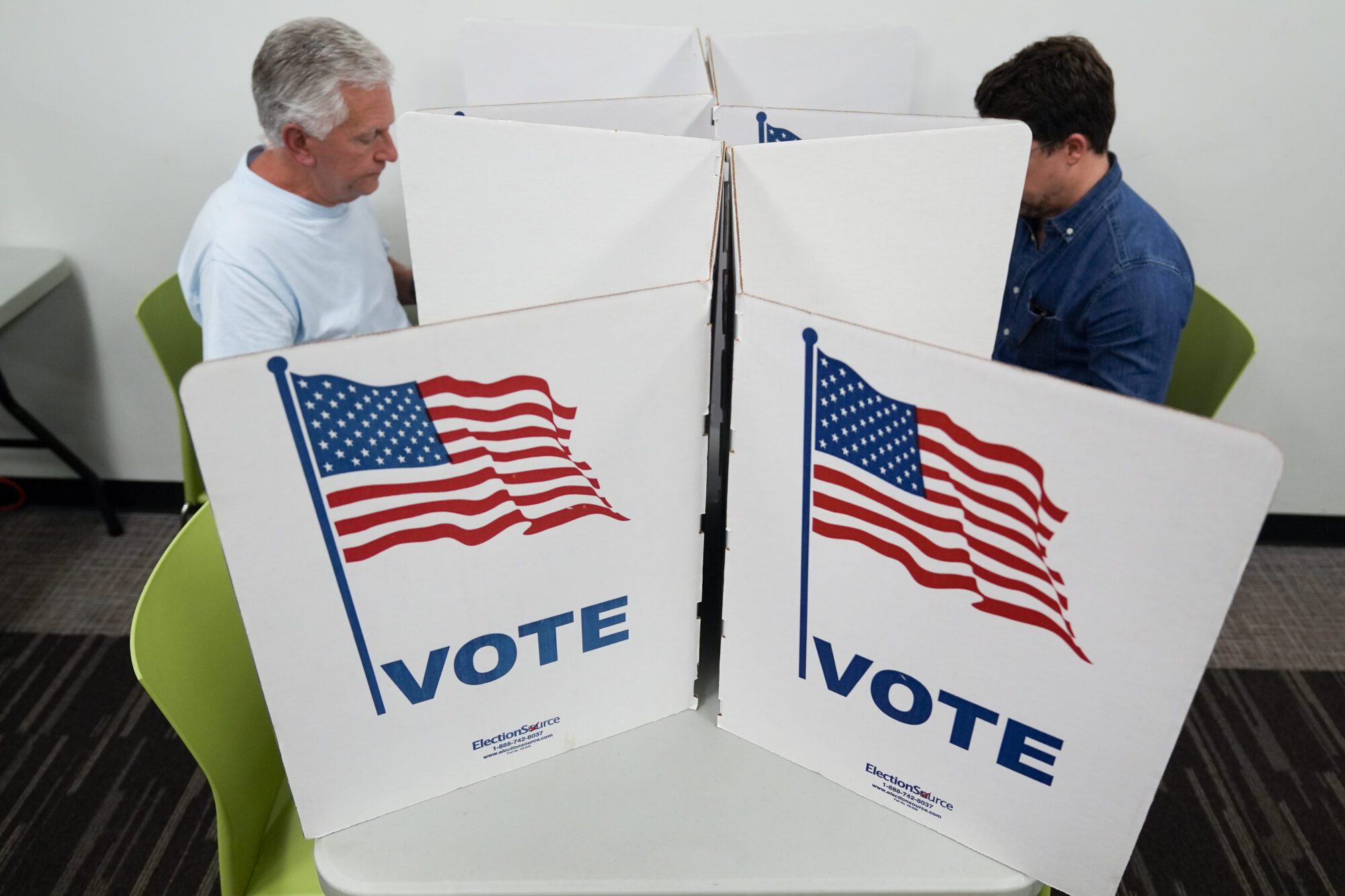
Governor Tate Reeves and candidate Brandon Presley spoke at the Neshoba County Fair on Thursday.
Incumbent Republican Governor Tate Reeves and Democratic nominee Brandon Presley are barreling toward the General Election. What separates the candidates?
Mississippi is now a week out from its November 7th general election. The most talked about race this cycle will be at the top of the ballot, as incumbent Republican Governor Tate Reeves is being challenged in his bid for re-election by Democratic gubernatorial nominee Brandon Presley, the current Northern District Public Service Commissioner.
Experience in Elected Office
Both candidates have been on the ballot in Mississippi for 20 years or more.
Reeves first ran for office in 2003, winning the State Treasurer race and becoming the first Republican to hold that position in Mississippi history. After serving eight years as State Treasurer, Reeves ran and won the Lieutenant Governor’s seat in 2011, again serving in that office for two terms before running for Governor. He won his first term as the state’s chief executive in 2019.
From ice storms and floods to tornadoes and hurricanes to a global pandemic, no Governor in Mississippi history faced more natural or man-made disasters during his first term in office than has Reeves.
Presley, a lifelong Democrat, ran for Mayor of Nettleton in 2001 and served his hometown until he won the Northern District Public Service Commissioner race in 2007. He has since served four terms on the three-man Public Service Commission. Despite considerable experience running for office, this is Presley’s first statewide run.
Campaign Messaging
The Reeves’ campaign has focused on accomplishments during his tenure as Lieutenant Governor and Governor, including the largest tax cut in Mississippi history, the largest teacher pay raise in Mississippi history, historic education gains in reading, math and graduation rates, efforts to protect life and traditional family values, and economic growth and job creation.
Playing on those reforms, Reeves has spoken about keeping the “Mississippi momentum” going. He has advocated for the complete elimination of Mississippi’s income tax. In response to concerns over hospitals’ financial stability, the Reeves Administration has requested approval for increased reimbursement rates for Medicaid patients during the course of the campaign.
Presley has never held a strict “policymaking” office, meaning his experience affords him fewer past accomplishments to tout. He has pointed to the expansion of rural broadband during his time on the Public Service Commission.
Presley’s campaign has been disciplined in focusing on just a handful of policies he intends to push if elected: Medicaid expansion, a proposal to eliminate sales taxes on groceries, a proposal to reduce the cost of car tags, and a package of ethics reforms.
The campaigns have not all been positive. Over the course of the 2023 election cycle, both Reeves and Presley have hurled various accusations at each other. Presley has alleged Reeves is culpable in the state’s welfare scandal, which occurred prior to Reeves assuming the Office of Governor. Reeves has alleged Presley took illegal campaign donations from public utilities regulated by the Public Service Commission. Mississippi law makes it a crime for a sitting Public Service Commissioner to do so.
Neither have been charged with any crimes.
Policy Positions
As for the policy positions of Reeves and Presley, it can be easy to get lost in all of the rhetoric and social media traffic as the campaigns go back and forth.
To help clarify where the two gubernatorial candidates stand on the issues, below is a quick guide to what the two have said on the campaign trail and beyond on matters of importance related to Mississippi’s economy, the state’s education system, and the healthcare system.
Given that Reeves has held multiple statewide offices and has been actively involved in the legislative process during his service as a Republican leader, there are far more readily available news articles and comments to draw from than for Presley. Presley’s campaign has largely limited his overall talking points to those matters the Democrat has made central to his campaign and has rarely gone off script even when pressed.
ECONOMY
Tax & Spending Policy
Governor Reeves signed into law the largest tax cut in state history at the end of the 2022 legislative session. It passed the Legislature by a vote of 39-10 in the Senate and 92-23 in the House. Both chambers drew bipartisan support, though all opposition votes came from Democrats. The measure phases out the 4% bracket, cuts the remaining 5% bracket to 4% by 2026 and provides tax relief of roughly $525 million per year by 2026.
RELATED: Mississippi’s Tax Freedom Act spells relief for working class families
“It is a win at the beginning of this fight. It is not the end,” the Mississippi Governor said at the time.
Reeves has since repeatedly voiced his support for the full elimination of the income tax.
“I don’t think there is any doubt that eliminating the individual income tax would make Mississippi more competitive for not only capital investment, but also for people,” said Reeves.
Presley, on the other hand, has said that while Reeves “brags” on the state’s multi-billion surplus, he has done nothing to benefit taxpayers. Presley has not endorsed income tax elimination. Instead, he has proposed two smaller forms of tax relief. First, he wants to end the application of Mississippi’s sales tax on groceries. Next, he wants the state to subsidize the purchase of car tags, which are taxed at the county level.
Referring to surplus dollars, Presley has said, “How about use that money and put at least some of it back in the hands of taxpayers by getting the sales tax off of groceries and cutting the car tag fees in this state.”
“As governor, I’ll finally axe the grocery tax,” Presley has said in campaign ads and stump speeches, adding, “And how about this? I’ll take a saw to the cost of car tags and cut them in half.”
According to the Department of Revenue in a recent Magnolia Tribune report, sales tax generated from grocery stores in Mississippi in Fiscal Year 2022 was just over $283 million, an amount that is a fraction of the nearly $2 billion in income taxes collected in Mississippi.
Economic & Workforce Development
Governor Reeves has said it is vital that every Mississippian who wants a job can get a job. He’s identified workforce development as one of the most important issues in the state. During his tenure, a new workforce development agency, Accelerate Mississippi, was created.
“The future of Mississippi’s economy is being decided today,” Reeves said in a statement earlier this year. “We’ve made record investment in workforce development and because of that, our state’s unemployment rate is at an all-time low and more Mississippians are working than ever before.”
Reeves has signed into law measures aimed at expanding career coaching programs, increasing technical training programs at community colleges, and appropriated funds for direct career training related to healthcare, logistics, supply chains, and specific populations such as veterans, those currently or formerly incarcerated, and single parents.
In addition, Mississippi has seen record investment in the private sector across the state over the last four years. The largest of these investments came in 2022 when the $2.5 billion corporate investment by Steel Dynamics, Inc., its subsidiaries, and its partners was announced. The project is expected to create 1,000 jobs with an average salary of $93,000 in Lowndes County.
Governor Reeves also signed into law the Broadband Expansion and Accessibility of Mississippi Act and appointed an executive director to the new office that is overseeing federal funding for broadband expansion. Reeves has said this opportunity is a positive for economic development in rural areas and for the families that will benefit most.
“It is my strong belief that one’s zip code should not limit access to these technologies,” Reeves said at the bill signing.
Presley, the current Northern District Public Service Commissioner, has long advocated for broadband expansion. He was among the players that helped secure funding through Congressman Bennie Thompson (D) and the Biden Administration, using his office at the PSC. Presley has criticized Reeves for being “missing in action” when he was Lieutenant Governor and the broadband funds were initially sought.
Presley has pointed out that Reeves didn’t sign bills in 2020 that appropriated the federal funds for broadband.
“The appropriation bill for $75 million for co-ops and companies for broadband, he didn’t even sign, in the middle of a pandemic,” Presley said. “He needs to shut his mouth how he’s been for broadband.”
Presley put forward an economic development plan earlier this year that would create a Public-Private Task Force on Economic Diversity while providing workforce training scholarships. He wants to strengthen Mississippi’s Equal Pay law and provide more access to childcare. Presley also called for more investment in the state’s infrastructure.
Despite the Mississippi Department of Transportation receiving a record level of funding from the Legislature in 2023 and being signed by Governor Reeves, coming in at nearly $2 billion, Presley has been critical of the state’s infrastructure investments. At a recent campaign event in the Delta, the Democrat said the state has neglected the infrastructure needs of the area west of I-55.
“How do you expect to attract industries and create jobs from Natchez all the way up to the Delta without proper investment in infrastructure,” Presley said, as reported by the Natchez Democrat. “You have counties in the Delta that don’t have a four-lane road, and you expect them to recruit an industry? Come on.”
EDUCATION
School Funding & Education Freedom
Both Reeves and Presley have repeatedly called attention to their support for Mississippi teachers and increased investment in the state’s education system.
In 2022, Reeves signed into law the largest teacher pay raise in state history. Under the law, the average annual teacher pay increased by $5,151 for the 2022-2023 school year. The increase marked an 11 percent pay bump for the average teacher, bringing their salaries from $47,902 in the 2021-2022 school year to just over $53,000 this past school year.
The teacher pay raise marked a $246 million investment in the first year of the program. The Legislature appropriated an additional $100 million for classroom learning in the 2023 legislative session. In recent years, Mississippi has received increased attention for its education gains in reading, math and graduation rates. These improvements are often linked to a package of education reforms that occurred in 2013, when Reeves was then Lt. Governor.
RELATED: Jeb Bush & Dr. Kymyona Burk talk about Mississippi’s historic gains in literacy
“I want to personally thank all the legislators that played a role in helping to pass those education reforms. I also want to thank all the involved parents and dedicated teachers across Mississippi. We couldn’t have accomplished these goals without you,” Reeves said in his 2023 State of the State Address. “Our state – unlike some others that have been in the news – recognizes that we have a duty to both. We should ensure that parents continue to play an active role in their kids’ education, and we should ensure that teachers are paid what they deserve.”
Reeves said when it comes to education, Mississippi should protect parents’ voices and their right to be involved in the classroom. He has called on lawmakers to pass a Parents’ Bill of Rights. In the past, Reeves has been an outspoken advocate for giving parents more freedom over how and where their children are educated, including support of public charter schools and education scholarship accounts for special needs families to find an education setting that best works for them.
Having never been in a policymaking position that impacts education policy, Democratic candidate Presley has no past accomplishments to herald. He has put all of his emphasis in the education space on public schools and public school funding.
Presley has called for another teacher pay raise and increased funding under the Mississippi Adequate Education Program (MAEP) – a formula that Republican leaders have long held should be revised. He also has called for the creation of a school “infrastructure” program to help school districts refurbish or rebuild aging facilities.
In 2023, the Legislature passed, and Reeves signed into law, The Educational Facilities Revolving Loan Fund (EFRLF). Forty million dollars was initially allocated to the EFRLF. The program is designed to support public education infrastructure by making funds available for school districts to pay down district debt, repair or renovate buildings, or build new Pre-Kindergarten or Career and Technical Education Centers across the state.
Presley has not articulated support for any form of education freedom that would permit families to choose the right school for their children.
HEALTHCARE
Medicaid Expansion
Medicaid is a welfare program that provides taxpayer funded assistance to individuals who cannot afford healthcare. Under the Affordable Care Act, often referred to as Obamacare, states had the option of expanding eligibility and increasing their recipient rolls.
Presley has beat the drum for Medicaid expansion since he kicked off his campaign. He’s promised to expand Medicaid on “day one.” Of course, in Mississippi’s system of government, a governor cannot simply enact policy. The Legislature would have to approve any such proposal.
“Tate Reeves is fiddling while the health care system in Mississippi burns to the ground,” Presley has said.
Reeves has been opposed to what he calls “Obamacare expansion.” Opponents of expansion argue it would add hundreds of thousands of new recipients at a considerable cost to the state, eating into funding for other core functions like education. They also argue it poses a considerable risk to states fiscally if the federal government ever changes the funding formula for the program and reduces its contribution.
“To me, expansion of Obamacare, while it adds a lot of people to welfare does not have the kind of financial impact that many think it will have,” said Reeves in September. He went on to say, “…adding 300,000 able-bodied Mississippians to the welfare rolls I would argue is a bad idea.”
Presley has contended that Medicaid expansion would help save financially at-risk rural hospitals, systems that have seen large losses in population compounded by changing delivery methods away from in-patient care.
RELATED: Medicaid Expansion not a silver bullet for rural hospitals
During the legislative session, $103 million were appropriated to aid hospitals, but there have been some technical impediments to releasing the funds. Reeves recently announced Medicaid reimbursement reforms estimated to generate nearly $700 million in new revenue for hospitals in Mississippi.
The first proposal would increase Mississippi Hospital Access Program reimbursement rates for Medicaid patients in the managed care delivery system to the average commercial rate. Average commercial rate has long been considered the federal ceiling for Medicaid reimbursements in managed care.
The second proposal would supplement Medicaid base payment rates for hospitals by reimbursing inpatient and outpatient hospital services in the fee-for-service system up to the Medicare upper payment limit. This payment mechanism, known as a UPL, is calculated similarly to the one-time emergency payment of $137 million that hospitals received through the Mississippi Division of Medicaid earlier this calendar year.
Presley says these reforms are too little, too late.
“If Tate Reeves really cared about ending the hospital closure crisis he created, he would call a special session and expand Medicaid so working families can get the healthcare they need,” the Democrat said.
Certificate of Need Laws
Certificate of Need programs (CON) have been used to regulate resources within the healthcare industry. These laws are tools by which states require hospitals and healthcare system providers to prove a community need before opening a new facility or expanding in an area. Critics say it hurts competition in the healthcare marketplace and results in less opportunities for care for patients.
Governor Reeves supports reforming CON laws to encourage innovative healthcare delivery models to grow in Mississippi.
“By reforming Mississippi’s certificate of need laws, we can root out anticompetitive behavior that blocks the formation of medical facilities and prevents the delivery of life saving healthcare for our fellow Mississippians,” Reeves has said.
The hospital lobby, namely the Mississippi Hospital Association, has actively worked to kill any reforms considered at the Capitol for years. Their PAC voted to back Democratic nominee Presley during this election cycle, donating $250,000 to his campaign. The move sparked a division among the MHA member hospitals, resulting in some of the largest systems to leave the organization and the eventual parting of ways with their longtime President.
Presley has expressed an openness to reforming CON laws but has stopped short of backing efforts that would accomplish such a goal. Instead, he and his campaign have routinely circled back to the Democrat’s want of Medicaid expansion to buoy the hospitals the state currently has, even if such relief doesn’t cure all of their financial struggles.
Reproductive Rights
Both candidates have indicated that they are “pro-life.”
Reeves presided over the Mississippi Senate when the “heart beat” law was passed which became the foundation of the Dobbs case, which overturned Roe v. Wade.
Gender Issues for Minors
In 2021, Reeves signed into law The Fairness Act, a law designed to prevent biological boys from playing girls’ sports. In March, Reeves signed the REAP Act into law. The law establishes a medical standard of care that precludes physicians from performing gender reassignments on minors, or supplying medicinal treatment that would have the same effect.
Speaking on the REAP Act, Reeves said in a statement: “At the end of the day, there are two positions here. One tells children that they’re beautiful the way they are. That they can find happiness in their own bodies. The other tells them that they should take drugs and cut themselves up with expensive surgeries in order to find freedom from depression. I know which side I’m on. No child in Mississippi will have these drugs or surgeries pushed upon them.”
Activists in the LGBTQ community and on the Democratic side of the aisle heavily opposed the law. Yet, when asked what he thought of the bill by the Clarion Ledger, Presley initially gave a non-answer and referred back to Medicaid expansion.
However, in May, Presley said he would not seek to reverse such laws as the REAP Act, calling the issue “settled” even as the Mississippi Democratic Party voiced their opposition to the law saying it was a “clear violation of human rights.”
Then, in June at the Mississippi Press Association, Presley was asked about his position on the new law.
“I trust families, I trust mommas, and I trust daddies to deal with the health care of their children first and foremost, period,” Presley responded. This statement led some to speculate that Presley would not have signed the REAP Act. The statement occurred in close proximity to Louisiana’s Democratic governor John Bell Edwards vetoing similar legislation. Edwards’ veto was ultimately overridden by the Louisiana Legislature.
Again, in August, Presley felt the need to respond to rhetoric swirling around the issue. His campaign sent out a statement saying, “As a man of faith who is pro-life, I’ve never had an issue disagreeing with my party when they’re wrong, so I’ll be clear. I don’t think boys should be playing against girls, and girls shouldn’t be playing against boys. I don’t think minors should be getting surgery to change their gender.”











